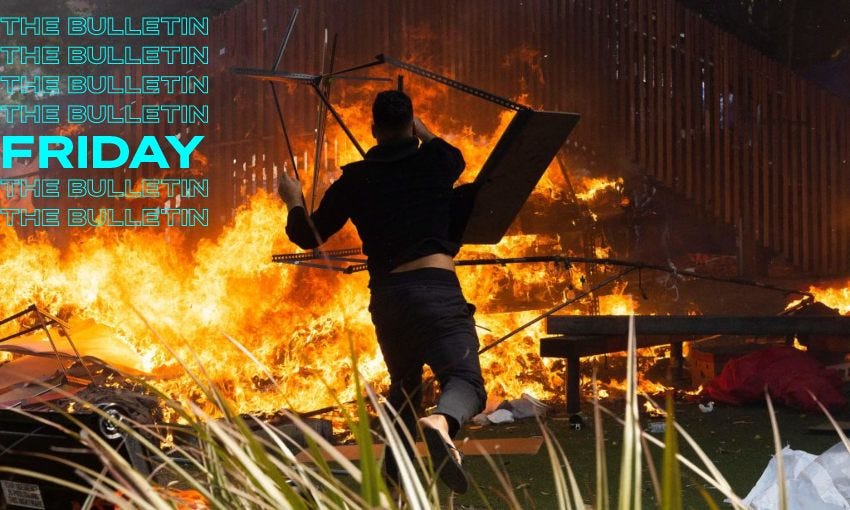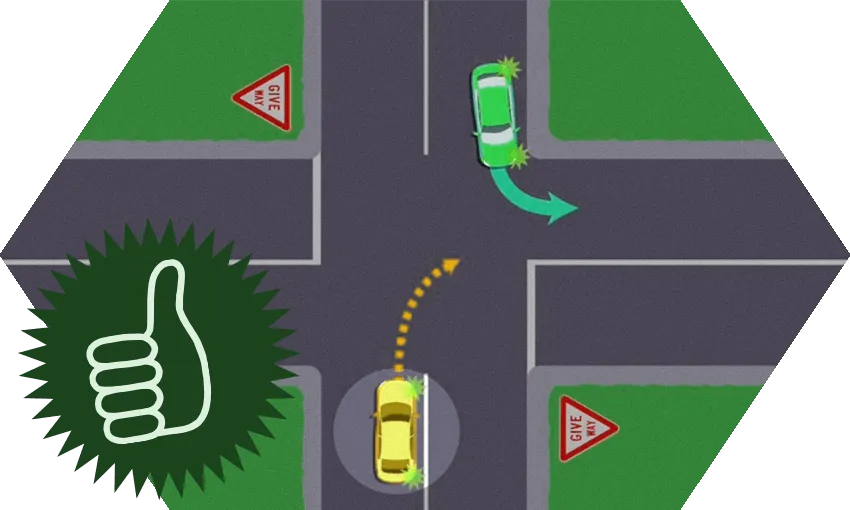Investigating the occupation
The opposition has called for an inquiry, but there’s been no move from Labour to review the three week occupation of parliament’s grounds
Mōrena and welcome to The Bulletin for Friday, March 25, by Justin Giovannetti. Presented in partnership with Z Energy.
In today’s edition: Refugee deal with Australia; a possible move to orange; ordering groceries from overseas; but first, how to review the occupation.
A rioter throws a desk on to a fire by the parliamentary playground. (Marty Melville / AFP via Getty Images)
Physical damage to parliament is still being repaired, but what of the deeper damage to democracy.
In the final days of the three week occupation of parliament, prime minister Jacinda Ardern promised that a review of some kind would be held to look into the response. The occupation saw over 100 arrests, 40 police officers injured and mass disruption to the capital. Three weeks after the protest ended in a fiery riot, work is still underway to clean up parliament’s grounds. However, momentum for an inquiry has now stalled and it risks becoming a partisan issue.
Where are the inquiries into the occupation?
Labour members controlling parliament’s justice select committee blocked a request last week by National MPs to hold a hearing into the occupation and riot. RNZ’s Jane Patterson explains the current state of inquiry into the protest. The government said it was waiting on the Independent Police Conduct Authority to confirm whether it’ll look into the protest and what its terms of reference are. The opposition has voiced concerns about leaving an inquiry to the IPCA, which has more experience looking at individual police misconduct than broad situations like the occupation. The police minister confirmed that no discussion has been held at cabinet about a broader review. The IPCA revealed yesterday that it will conduct a year-long investigation tightly focused on police actions, The Dominion Post reports.
The opposition wants parliament to have a role in a wider review.
Speaking with Stuff, National leader Christopher Luxon said a larger inquiry of the occupation is needed. He worries that an IPCA review would look too narrowly at the protest and not at larger issues that need to be examined. It’s about much more than the interactions between police and protesters. There’s the role of the speaker in terms of blasting music and turning on parliament’s sprinklers; misinformation and the lack of warning from the intelligence agencies, as well as the wider impact on Wellingtonians. The prime minister has said she expects parliament will eventually look at its own operations and whether the grounds should remain open to the public in the future. There’s been no indication on when that might happen.
Why did Labour block an inquiry by parliament?
Labour’s justice committee chair, Ginny Andersen, last week obstructed an opposition request to call the police commissioner to front over the occupation. Contacted by Newsroom to explain the decision, Andersen said the prime minister had spoken about the situation and she had nothing to add. Committee chairs are independent from the prime minister’s office and can hold significant power in parliament. As Newsroom’s Jo Moir writes, it’s noteworthy that Andersen didn’t think she had to explain herself to the public. Labour has a majority on all of parliament’s select committees. In the aftermath of the occupation, there are a number of significant ways parliament could respond. The Conversation makes the case for why a new law is required to protect the heart of the country’s democracy.
The generous support of our members powers all of The Spinoff's journalism, including live updates, the award-winning collaborations between Toby Morris and Siouxsie Wiles, and richly reported feature writing.
As we continue to struggle against commercial headwinds, contributions from our members are more critical than ever. If you value what we do and have the means to do so, please make a donation today and support our mahi.
Australia takes up New Zealand’s offer to resettle refugees.
Nearly a decade after the offer was first made, Australia has approved sending up to 150 refugees annually to New Zealand from its detention centres in the Pacific. As RNZ reports, Australian authorities had rejected the proposal until now, citing concerns that refugees could eventually become New Zealand citizens and then travel to Australia. The arrivals will count against Aotearoa’s refugee quota. According to Stuff, New Zealand has failed to meet its quota for the past three years. Only 463 refugees were accepted last year out of a quota of 1,500.
Looking forward to a move to orange.
The prime minister indicated yesterday that some regions of the country could move to the orange level of the traffic light system in the near future. 1News reports that Auckland could be first to move, once hospitalisation levels stabilise. As for a future move to green, that shouldn’t be expected before the end of winter at the earliest. All of this will depend on the future of the pandemic, which is highly uncertain. There’s now talk overseas about a deltacron mashup. RNZ explains how the combination of delta and omicron happened and whether we should be worried.
Want cheaper groceries? Order from Australia.
Earlier this month the Commerce Commission said that competition wasn’t working well in New Zealand’s grocery sector. A shopper in Otago found out how poorly. She told 1News that she found it 35% cheaper to ship grocery items from Australia than to buy them at her local supermarket. She took advantage of a free shipping offer, but shipping would have only added $15 to her final price. Her biggest savings was on toothpaste.
Out now on The Spinoff: a second season of FIRST
A brand new season of interview series FIRST starts on The Spinoff this week, with dancer, Celebrity Treasure Island star and all-round entertainer Lance Savali telling us about his first failed experiences with hair dye, earliest stage performances and much more. Like last year, when we heard the stories behind the firsts of New Zealand musicians, actors, comedians and politicians, we’ve got another exciting mix of guests coming up in season two – from comedians Urzila Carlson and Joe Daymond to musicians Disciple Pati, Liz Stokes from The Beths and more.Subscribe to The Spinoff on YouTube for new episodes every Wednesday, and visit thespinoff.co.nz/videos to watch every episode so far.
IMF calls for significant rise to interest rates in New Zealand.
The International Monetary Fund warned in its annual review of New Zealand’s economy that the government needs to be careful removing emergency supports, but interest rates need to rise quickly. The NZ Herald (paywalled) notes that the international body highlighted a risk to highly indebted homeowners, but said it was necessary. Its main warning is that Aotearoa faces a risk in the coming year from the unstable global situation and a possible slowdown in China. Interest reports that it also recommended the government bring in a capital gains tax to reduce corporate taxes.
Machu Pichu has gone by the wrong name for a century.
A Peruvian historian and US archaeologist are arguing the Inca site, one of the world’s best-known archaeological finds, was actually called Huayna Picchu. The Guardian explains that the name is of a peak overlooking the ruins. It may have also just been called Picchu. Where did the Machu come from? That’s unclear, but a rebrand probably won’t happen.
Got some feedback about The Bulletin, or anything in the news? Get in touch with me at thebulletin@thespinoff.co.nz
Toby Manhire writes about the great New Zealand give-way U-turn, a decade on. Alex Casey ranks and reviews every freaky thing in Wellington Paranormal. Reweti Kohere speaks with parents of vulnerable children angry at the easing of Covid restrictions. Sela Jane Hopgood reports ASB Polyfest is going online-only and students are cheering on from the couch. Don Rowe explains how flood defences are holding up in Tairāwhiti.
Wellington Phoenix to play at home for first time in a year.
The men’s football side will host a game in Wellington at Easter weekend with a possible match at Eden Park in Auckland a week later. RNZ reports that the Phoenix have spent their season based in Australia due to Covid-19 border restrictions. The club is currently in seventh spot, three points outside a playoff berth. The government’s decision to remove outdoor gathering limits has helped the team with its plans to return.














